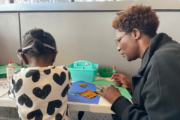For international students at U.S. colleges, having a mentor can be invaluable. When Victoria Keane arrived at Hofstra University in New York in the fall of 2021 from Trinidad and Tobago, she contracted COVID-19 and missed the first two days of international student orientation.
Keane says being an introvert and missing the initial opportunity to integrate with her peers or learn to navigate Hofstra’s campus made her anxious and nervous. But then her mentor stepped in.
“I heard a lifesaving ping from my phone, which I discovered was a text message from my global mentor,” Keane says. “She reached out to find out if I had settled well and to encourage me to come to the international student picnic.”
Many U.S. colleges and universities have programs that assign mentors to incoming international students, such as at the University of California, Berkeley, the University of Minnesota Duluth and DePaul University in Chicago, to name a few.
Connecting with a mentor can help students acclimate before and during the school year, experts say. Here are some reasons for international students to connect with a mentor on campus.
Make Local Friends
For incoming international students, mentors can often be their first friend at a new school in a new country.
“Connecting with a mentor early allows international students to address specific questions and concerns they may have before arriving, especially those they might not feel comfortable asking the administration,” says Shannon Paul, director of international student enrollment at Hofstra.
Paul says Hofstra recommends that students connect with mentors as early as the summer before they arrive on campus. “Forming this bond with a current Hofstra student provides a familiar face and a welcoming connection on campus, making the transition to university life smoother and more comfortable.”
[First-Year Tips for International Students at U.S. Colleges]
Nitivia Jones, an international student and scholar adviser at Washington State University, says mentors and mentees are paired only for the first semester, but many maintain contact throughout their time in college. She says the network is also a good way for students to meet other students outside their major.
“It’s easy to get siloed,” Jones says, “so this program is a pathway for students to connect with other international students and domestic students that either have an interest or experience outside the U.S.,” Jones says.
Apart from pre-arrival outreach, students at Indiana University–Indianapolis can request individual peer-coaching “coffee conversations” with International Student Success Ambassadors through the school’s one-on-one connections program, says Aliza M. Frame, director of international student and scholar services in the Office of International Affairs.
“Ambassadors are trained on a wide range of peer coaching topics tailored for international students, including academic and cultural adjustment, career readiness and wellness,” Frame says.
Get a Personal Tour Guide
Even before their mentees set foot on campus, mentors can take the role of a big sister or brother by giving new international students a heads up about best spots to study or eat on campus and transportation options in and around campus.
“A lot of international students come in without cars, and so the buses will be their initial means of transportation, so one thing I have majorly done is helping students navigate the bus routes,” says Angel Ikueze from Nigeria, a mentee-turned-mentor for international students at Washington State.
Jones says once the initial excitement of orientation dies down and the first weeks of classes pass, mentors can become an even more valuable resource. “They help students navigate the nuances of campus life and the day-to-day challenges of living in a new country.”
This can include campus outings to get students more used to their surroundings.
[Discover three 3 Ways International Students Can Maximize Campus Life]
Frame says the Global Jags Connect program, which connects international students with IU and local alumni, faculty, staff and community members, offers “off-campus cultural excursions in the Indianapolis community and on-campus social events to help students make peer connections and learn more about the U.S. cultural context.”
The school’s goal is to “help foster a sense of belonging and international student success by facilitating opportunities for high-impact relationships and experiences for them,” Frame says.
Nattie Do from Vietnam transferred from community college to Portland State University in Oregon as a junior. She says even though she already had some experience living in the U.S., her mentor “still helped share some related resources, how to connect with my community and get support from staff for any common issues.”
Create a To-Do List
Mentors can help international students get started on their to-do list before they arrive in the U.S., which can benefit them throughout the academic year and beyond. This can include advice on how to set up a bank account, buy textbooks, get a driver’s license and find items needed for housing.
“They are trained to answer pre-arrival and post-arrival student life questions about registration, life in Portland, finding housing, banking, cellphones, finding work on campus, connecting with departments and more,” says Jill Townley, associate director of international student life at Portland State.
Janella Musni from the Philippines, a mentor and former mentee at Portland State, says the university’s mentors begin sending weekly emails to mentees in the summer before freshman year and continue through the end of fall term.
[READ: 9 Things to Do the Summer Before College.]
“These emails provide information about immigration, campus life, academics and recommendations for essential items,” Musni says. “We answer any questions and help them in any way possible.”
Frame says by getting students in communication early, “new international students and their families have ample time to consider their needs and take action.” This preparation allows students to “arrive feeling more prepared and connected and therefore more successful during their academic program.”
Keane, now a junior at Hofstra, says mentors open and maintain an important line of communication with their mentees, who can ask any questions they have about life at a U.S. college or in the U.S. in general.
She says when her mentor reached out during that tough time early on, she no longer felt alone. The experience made her more comfortable, gave her courage to continue on her college journey and allowed her to make core friendships she still maintains.
“Had it not been for the welcoming and warm nature of my global mentor, my nerves would have held me back and prevented me from thriving in the way I did my freshman year at Hofstra,” Keane says.
She says she never forgot that support and seeks to pay it forward as a mentor.
“I felt that if I could do what she did for even one other student, then I would be giving back to my peers in a heartwarming and meaningful way.”
More from U.S. News
15 Universities With the Highest International Student Acceptance Rates
Campus Resources for International Students
3 Steps International College Students Should Take Before Coming to Campus
Why International Students Should Seek Mentors at U.S. Colleges originally appeared on usnews.com







